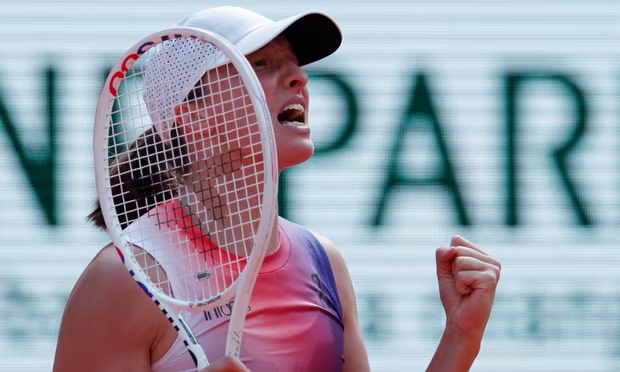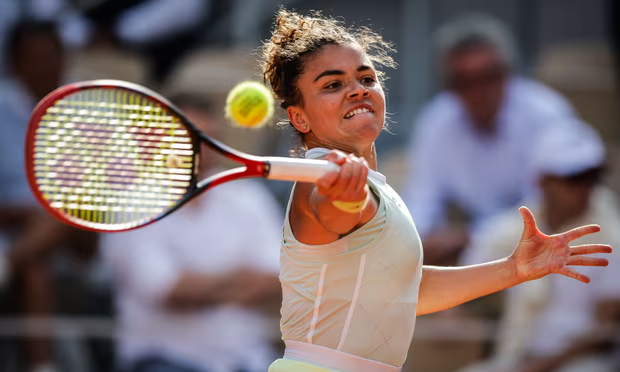
Iga Swiatek celebrates winning her semi-final against Coco Gauff. Photograph: Gonzalo Fuentes/Reuters
In recent years, Coco Gauff has found herself reflecting on the long-term relationships tennis forges. The opponents she faced years ago on the junior circuit are many of the same players she battles now as a top professional. If she and her contemporaries enjoy the long, full careers they are working towards, many of the same faces will be there until the end.
This means that Gauff, at 20 years old, has a long time to work towards reconfiguring her game and changing the direction of match-ups with Iga Swiatek, but it is also hard not to wonder how excruciating these encounters could become over the next 10 years.
Like last year in the quarter-finals and the final a year before, Swiatek continued her dominance of Gauff as she reached her fourth French Open final with a 6-2, 6-4 win. Her record against the American stands at 11-1.
Just a few days after her 23rd birthday, Swiatek has now reached four Roland Garros finals in her past five appearances. She stands one match away from a generational achievement that would cement her spot among the clay court greats: on Saturday, Swiatek will attempt to become the third woman in the open era to win three consecutive French Open titles. Only Justine Henin and Monica Seles have done this.
Having arrived in Paris with titles at Madrid and Rome, Swiatek has won 18 matches in a row, equalling her longest winning streak on clay from 2022. She has compiled a 16-4 record against top-five players since reaching world No 1 in March 2022. Last Wednesday, her pursuit of history was nearly derailed by Naomi Osaka in their instant classic second-round match. She has been on a revenge tour ever since.
“Sometimes it’s hard not to see what’s at stake and what the atmosphere is around these matches,” said Swiatek, on whether her success now feels normal. “So still I’m not used to it. It’s not the routine. But on the other hand, when I’m really focused on work and on my tennis, I can kind of make it a routine because that’s easier way to do it.”
Iga Swiatek will face Jasmine Paolini, a first-time grand slam finalist, in the final after the 12th seed outplayed 17-year-old Mirra Andreeva 6-3, 6-1. Paolini, a 28-year-old late bloomer, had never previously passed the fourth round of a grand slam tournament. This year has proven a breakout year for her, though, having already won a WTA 1000 title in Dubai. “Really, really happy,” she said. “It’s a great feeling to be in a grand slam final. I don’t know. It seems something impossible, you know, but it’s true.”

The task facing Gauff on Thursday was succinctly summed up one point into the contest. After Gauff struck a forehand errror, a voice rang out from the crowd: “Allez Coco! C’est pas fini.” The first game ended with Gauff quickly striking three forehand errors and losing her serve.
Each time Gauff has fallen short against Swiatek, the American has made significant tactical changes. This time, she was determined to attack as early as possible, but her high-risk play came with a high error count. While the Pole was still in third gear, striking two winners and five unforced errors compared with 12 winners and 18 unforced errors from Gauff, Swiatek rolled through the set.
As Gauff found joy with her first serve and strung games together early in the second set, she broke serve for a 3-1 lead. But Swiatek always looked comfortable. She immediately forced herself inside the baseline, took control of the exchanges and methodically broke Gauff’s forehand. From 1-3 down, she rolled through four consecutive games before calmly serving out the match.
Gauff leaves Paris in a curious position. On one hand, she is doing incredibly well; she has more than fulfilled the hype that has followed her since her teenage years, now a grand slam champion and one of the very best players in the world. Next week, she will rise to a career-high ranking of No 2, behind Swiatek.
But on the 11 occasions Swiatek has beaten her, the Pole has won each one in straight sets and few have been close. Even the non-rivalry between Serena Williams and Maria Sharapova was marginally more competitive. It is up to Gauff to figure out how to close the gap.
“I think long-term I feel like it’s definitely something [I can change],” said Gauff of the head-to-head. “I can’t sit here and say it’s something I’m not going to want to turn around. I have to be positive and believe in myself.”






